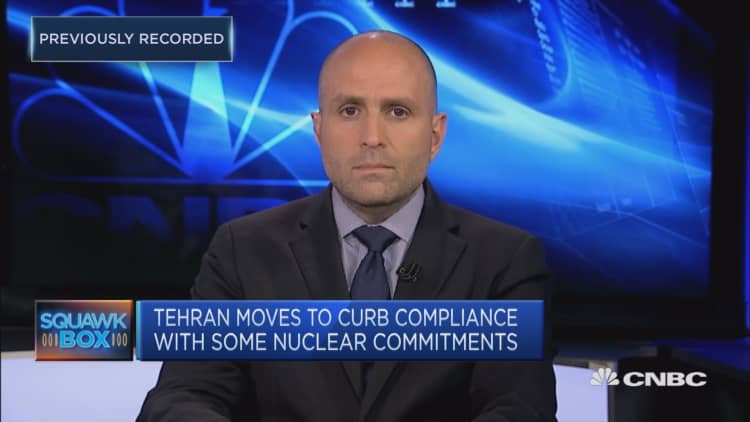
U.S. President Donald Trump's new sanctions on Iran and deployment of a carrier strike group to the Middle East are "deliberately provocative," Jarrett Blanc from the Carnegie Endowment for International Peace said Thursday.
Not only do these sanctions target Iran's export revenue, they also affect a "very large employment sector of the Iranian economy," said Blanc, a senior fellow at the Washington-based think tank. This will be "understood as an effort to destabilize the middle class," he added.
Trump on Wednesday slapped fresh sanctions on Iranian industrial metals — the country's second-largest source of export revenue after petroleum — and threatened further action unless Tehran "fundamentally" changes its behavior.
That came hours after Iranian President Hassan Rouhani announced Tehran's intention to violate two provisions of the 2015 nuclear agreement — also known as the Joint Comprehensive Plan of Action.
On Sunday, U.S. National Security Advisor John Bolton announced that the Trump administration would deploy a carrier group and bombers to the Middle East in response to "troubling and escalatory indications and warnings" from Iran.
Speaking to CNBC's "Squawk Box Asia," Blanc said the Trump administration — or at least some elements of it — wants to provoke Iran into violating the 2015 nuclear accord and spark a crisis. That would "box in a future Democratic president" and "make it harder to return to the deal and to diplomacy," he added.
Tehran's ultimatum
On Wednesday, Rouhani also gave other members of the JCPOA — Germany, France, the United Kingdom, Russia and China — an ultimatum. He threatened that Iran will restart part of its halted nuclear program if they did not resume oil trade within 60 days.
Europe responded on Thursday saying said it "rejects any ultimatums" from Iran, but remains "fully committed to the preservation and full implementation of the JCPOA."
Political risk consultancy Eurasia Group's analyst Henry Rome said in a note on Wednesday that while Rouhani's decision to "openly chip away at its nuclear commitments" does not immediately bring it closer to a nuclear weapon, it "marks the beginning of a new and concerning dynamic between the U.S. and Iran that is ripe for miscalculation."
The escalation came on the anniversary of the U.S. withdrawal from the nuclear deal and ratchets up already tense Washington-Tehran relations.
Trump's administration has taken unprecedented steps in what the president calls a "maximum pressure campaign" on Iran. One example is when Washington designated the country's Islamic Revolutionary Guards Corp (IRGC) as a terrorist organization in April.
There's very few levers that can be pulled if Iran is under complete sanctions.Roland Vogtassistant professor of European Studies at the University of Hong Kong
According to Blanc, the current administration "seems enamored with the idea that economic pressure can lead to regime change." Bolton and Secretary of State Mike Pompeo "made careers calling for regime change," he added.
"Economic pressure can be very, very effective when you're trying to get a change in policy that is not core to a country's national security interests, not core to a regime's sense of its own survival," Blanc said.
He added, however, that a reshuffle in the Iranian regime is more likely than a complete change.
There may be "a little bit of the realignment between the semi-democratic, semi-elected government, the kind of military industrial complex represented by the IRGC and the clerical establishment." But the result of that is "very unlikely" to be in the interest of the U.S. or its allies, he said.
'Unpredictable' Iran
According to another expert, while the U.S. and the European Union share the same objective of keeping Iran nuclear-free, both world powers do not share the same ideas on how to get there.
In an interview with CNBC's "Capital Connection" Thursday, Roland Vogt, an assistant professor of European Studies at the University of Hong Kong, said there is conviction in the U.S. that Iran "only responds to tough language."
On the other hand, European capitals "have felt that Iran will not negotiate under blackmail or coercion," he said.
Vogt, however, added that there is "merit" in pursuing the Iranian nuclear agreement because it allows "some sort of potential influence" over the Iranian government.
"Without it, (Iran) is very unpredictable," Vogt said.
"There's very few levers that can be pulled if Iran is under complete sanctions, that can be pulled in order to mobilize those forces within the Iranian government that want to come to a workable solution with the Western countries," Vogt added.

